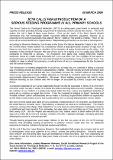March 2006 Basic Needs and Nutrition Basket: JCTR Calls for Introduction of a Serious Feeding Programme in all Primary Schools

View/
Date
2006-03-08Author
Jesuit Centre for Theological Reflection
Type
StatementLanguage
enItem Usage Stats
30
views
views
10
downloads
downloads
Abstract
The Jesuit Centre for Theological Reflection (JCTR) is calling upon government to seriously and
urgently consider providing feeding programmes in all primary schools across the country. The JCTR
makes this call in light of three major factors. First, on the basis of the Basic Needs Basket
information that has increasingly shown household difficult economic situations. Second, as a
response to the recently launched 2006 UNICEF Report “State of The World’s Children.” Third, on the
basis of the recent World Bank Report entitled “Repositioning of Nutrition as Central to Development.”
According to Muweme Muweme Coordinator of the Social Conditions Research Project of the JCTR,
the monthly Basic Needs Basket has consistently shown a disproportionate situation of high cost of
living on one hand and a general situation of low incomes of many households on the other. For
example, in the month of February, the cost of food alone for a family of six in Lusaka was K508,450
compared to K506,250 in January. In Livingstone food alone was costing K533,200, Kabwe
K465,020, Ndola K512,680, Kitwe K504,880 and Luanshya K507,710. This highlight of food alone is
designed to give prominence to the foremost of needs for every human being, the need for food. The
inability to meet or afford food presents us with all kinds of serious consequences for the household
and the overall economy.
Description
The introduction of feeding programmes in all primary schools has the potential of being a practical
way of creating schools as centres of attraction for children. This will not only promote enrolment and
retention rates in our schools but will more importantly improve the nutrition status of our children,
which is key especially to those children affected and infected by HIV/AIDS and those children from
economically disempowered households. Moreover, these feeding programmes will lead to more
effective learning by our children who will no longer be distracted by chronic hunger and regular
illness.